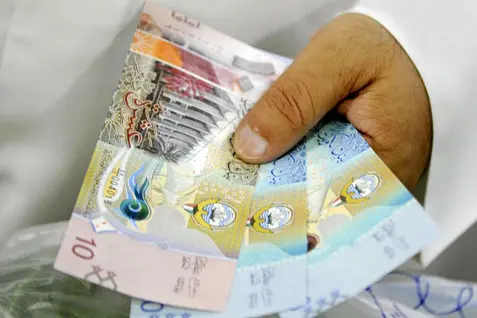PHOTO
DUBAI: Kuwait's central bank kept its key interest rate unchanged on Wednesday, citing the need to boost economic growth, despite a 0.25 percentage point rate hike by the U.S. Federal Reserve, which usually influences Kuwaiti policy.
The Kuwaiti decision set the country apart from other wealthy Gulf Arab oil exporters in the region. Saudi Arabia, the United Arab Emirates and Bahrain raised their rates within minutes of the Fed's announcement. Qatar was expected to follow suit, and Oman has been raising its rates gradually.
Kuwait, which manages its dinar currency
KWD=
against a U.S. dollar-dominated basket of currencies, imitated the Fed immediately after three U.S. rate hikes that started in December 2015.
But in June this year it kept its discount rate flat even though the Fed tightened policy again, and after the latest U.S. hike was announced on Wednesday, Kuwait again decided to leave its rate unchanged.
"The central bank left the discount rate unchanged at 2.75 percent to consolidate an atmosphere conducive to the recovery of economic growth rates," the central bank said in a statement.
Kuwait's economy is expected to shrink 2.1 percent this year, according to the International Monetary Fund. Although that is largely because of a cut in oil output under a global agreement among producers to restrain production, it also reflects a sluggish private sector.
Commercial bankers believe improving liquidity in Kuwait's banking system caused by higher oil prices has also persuaded the central bank to be less aggressive about raising interest rates.
Kuwait's trade surplus expanded 3.5 percent from a year earlier to 1.43 billion dinars ($4.75 billion) in the third quarter of this year, pushing more petrodollars into the system.
That helped the spread of the three-month Kuwait interbank offered rate
KIKWD3MD=
over the U.S. dollar London interbank offered rate
USD3MFSR=X
shrink to just 18 basis points from 69 bps at the start of this year.
Kuwait's central bank governor, Mohammad al-Hashel, said in October that he looked at two key factors when making interest rate decisions: Kuwaiti banks' interest rate margins and dinar deposit rate spreads with the U.S. dollar deposits.
On Wednesday, the central bank said its policy decision was based partly on the ability of local banks to absorb any effort to raise interest rates on their dinar deposits.
(Reporting by Andrew Torchia and Noah Browning, editing by Larry King) ((andrew.torchia@thomsonreuters.com; +9715 6681 7277; Reuters Messaging: andrew.torchia.thomsonreuters.com@reuters.net))
The Kuwaiti decision set the country apart from other wealthy Gulf Arab oil exporters in the region. Saudi Arabia, the United Arab Emirates and Bahrain raised their rates within minutes of the Fed's announcement. Qatar was expected to follow suit, and Oman has been raising its rates gradually.
Kuwait, which manages its dinar currency
But in June this year it kept its discount rate flat even though the Fed tightened policy again, and after the latest U.S. hike was announced on Wednesday, Kuwait again decided to leave its rate unchanged.
"The central bank left the discount rate unchanged at 2.75 percent to consolidate an atmosphere conducive to the recovery of economic growth rates," the central bank said in a statement.
Kuwait's economy is expected to shrink 2.1 percent this year, according to the International Monetary Fund. Although that is largely because of a cut in oil output under a global agreement among producers to restrain production, it also reflects a sluggish private sector.
Commercial bankers believe improving liquidity in Kuwait's banking system caused by higher oil prices has also persuaded the central bank to be less aggressive about raising interest rates.
Kuwait's trade surplus expanded 3.5 percent from a year earlier to 1.43 billion dinars ($4.75 billion) in the third quarter of this year, pushing more petrodollars into the system.
That helped the spread of the three-month Kuwait interbank offered rate
Kuwait's central bank governor, Mohammad al-Hashel, said in October that he looked at two key factors when making interest rate decisions: Kuwaiti banks' interest rate margins and dinar deposit rate spreads with the U.S. dollar deposits.
On Wednesday, the central bank said its policy decision was based partly on the ability of local banks to absorb any effort to raise interest rates on their dinar deposits.
(Reporting by Andrew Torchia and Noah Browning, editing by Larry King) ((andrew.torchia@thomsonreuters.com; +9715 6681 7277; Reuters Messaging: andrew.torchia.thomsonreuters.com@reuters.net))





















